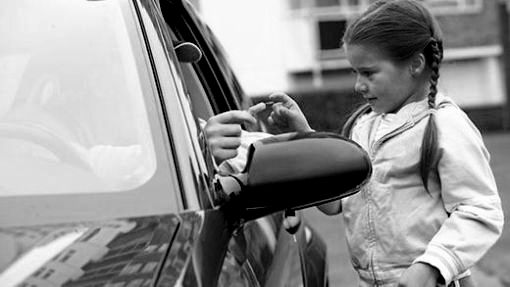In the matter of protecting the child, perhaps not a single question attracts such close attention as teaching children to communicate with strangers. “Never talk on the street with a stranger!” - parents strictly pronounce. However, to talk about it is much easier than to teach children to behave correctly and consistently in real life. How to protect a child from dangerous and annoying strangers and at the same time not instill in him fear of strangers?

Rules for communicating with a stranger
Let's find out what experts offer to teach children how to communicate (or not communicate) with potentially dangerous strangers.
- We introduce the concept of "stranger"
Usually, the child is ready for this at the age of four. Explain that strangers are those people (all the same, elderly, young men or women) who are unfamiliar to the baby and his parents. This can be shown by a common example - for example, a man in a supermarket or a woman in a park. In order not to scare the child, emphasize that this does not make them neither good nor bad. We also explain who these “familiar” people are, about which parents can say: “Honey, we absolutely trust these people. Do not be afraid to turn to them for help! ” Also, the child himself should also note: "Yes, mother, I trust this aunt and I'm not afraid of her."
- Celebrating the “Good” Strangers
Remember that some strangers - police officers, firefighters, sellers, teachers (educators) or security guards in stores - these are the same strangers people whom children can approach in case of an emergency. Pay attention to the child, what the uniform of law enforcement officers looks like, by what signs he can recognize the person who works in the store, etc.
It is important that the child understands: that stranger to whom he himself turns for help is still safer than the one who offers it first.
- Set boundaries and distances
Children should know that they can talk on the street with strangers, but only at a certain distance. We offer the following: measure a distance of 2 meters on the floor of the house and make sure that the child remembers it. This is the minimum distance at which children can communicate with unknown people without fear.
- Learn to say no
Criminals are often quite good psychologists and easily distinguish among children the one who does not know how to withstand the requests or orders of adults and who easily fall under the influence of others. Explain to your child that you should trust your instincts. If he is asked to go somewhere or help find something, you need to say loudly “no!” and leave.
4 steps to interrupt a conversation with a stranger
So, you explained to the child the basic rules and concepts. And in order for strangers not to be able to deceive your child or “speak” him, rehearse the order of conversation and actions.
Step 1. Assessment of the situation. The child must make sure that it is a stranger in front of him. And it does not matter who exactly - men of good appearance, grandmother, young girl or teenager. They are all strangers, and therefore should behave with them the same way.
Step 2 Keeping distance. Suppose a stranger turned to your offspring with some kind of request or question. In this case, he must make sure that he is at a sufficient distance (2 meters from the stranger) and has the ability to monitor his further actions.
Step 3 Interruption of a conversation. You may have seen one of the episodes of the popular program, in which you conducted a simple and at the same time terrible experiment: it turns out that a stranger can take away any child from the playground or even from the entrance of a child. Therefore, the baby should immediately stop the conversation: “No, contact an adult. He will show you the way "or" No, I can not help you find a dog. "
Step 4 Safe place. If an unfamiliar man tries to talk with a child, then you need to go home, go to school (from there call your mom or dad), go up to neighbors walking in the yard, in general, be in front of other people.
We also read: A stranger sticks to a child - what should children do?
We are losing the situation
Play various situations (“what would you do if ...”) to teach your favorite child how to behave in the presence of strangers. For example:
– Hello, dear girl!
- Good afternoon (assessment of the situation - an unknown man; maintaining the distance - the child moves away, at a distance of 2 meters).
- Girl, my little puppy got lost in a nearby park. Please help me find it.
- No, I need to go home, my mother just called me (the girl should immediately move closer to the adults, not listening to what the man continues to say. Once safe, she always tells her parents about what happened).
Required practice these four steps: assessing the situation, maintaining a distance, ending the conversation, and leaving. Explain that you can’t leave the yard or school with strangers: drive a car, help a cute puppy, go to a cafe or a toy store. Do not intimidate the child, but tell us that sometimes it’s difficult for an adult to distinguish between an evil person and a good person, so it’s best not to maintain a conversation with strangers. Just in case!
READ ALSO:
- 7 rules your child must learn to protect himself from strangers
- 10 questions that a child should not answer to strangers (and even familiar people)
- 10 precautions that parents should educate their child
In a solid, but understandable form, the child needs to be told that talking to strangers is not allowed!









My child is still two years old, and the security issue is very acute already. My girl is sociable and not afraid of other people's adults, it can be seen when there is a conflict and I just move away from her, giving time to calm down, people passing by say one phrase, after which the daughter calmly gives a hand. Now I am with her 24 hours a day, but what's next? I realized that from 4 years old I need to start explaining who is who.
Everything is described correctly in the article, only a lot depends on the child himself, how much he is contacted or vice versa closed in himself. I have a contact daughter, especially if I'm near. But if I am not, then in life he will not go with anyone. Maybe this contributed to the fact that I did not delegate it to anyone. She did everything herself, if you need to pick up or take him somewhere, then only with dad or mom, well, maximum with grandmother. I think this is also important, she’s used to the fact that only close people take her, and not some friends or friends. Of course, it is important to learn to behave properly with strangers. But you shouldn’t intimidate the child either, so that you don’t hesitate to ask for help from the same mothers with children, elderly people, you never know what the situation is.